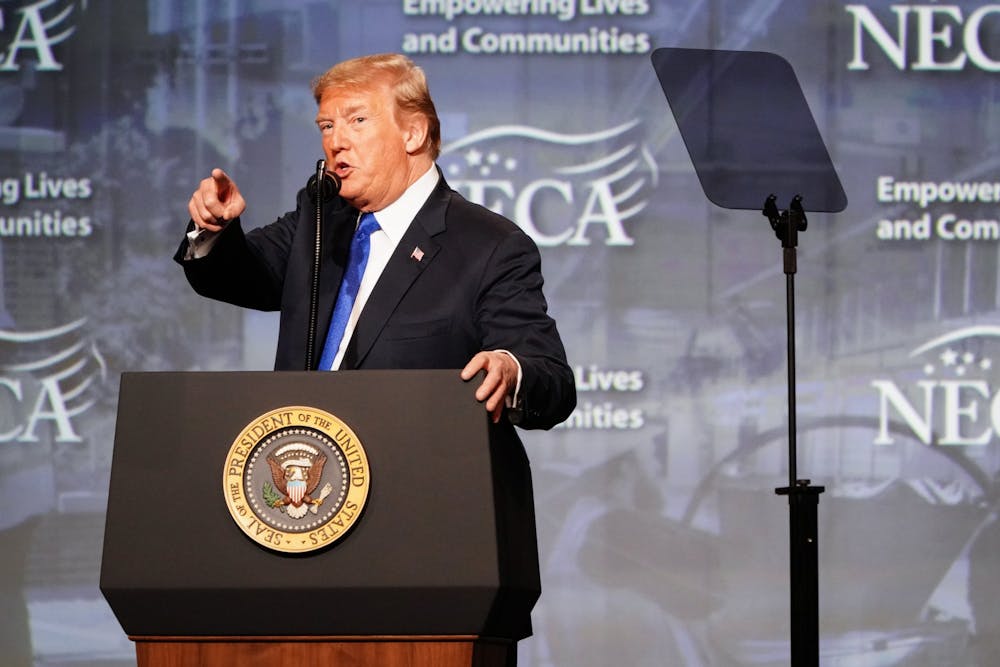
Over the past week or two, President Donald Trump has stepped up his anti-China rhetoric over the COVID-19 pandemic. He accused the world’s second-largest economy of releasing the novel coronavirus on the world, and of attempting to sabotage his re-election bid with the outbreak. At the beginning of May, he announced plans to impose more tariffs on China in retaliation, a move which analysts have warned would only further weaken the American economy.
When the Trump administration demands monetary compensation from China for the economic losses sustained due to the pandemic, it provides the public with a scapegoat for all the uncertainty and anxiety caused by the pandemic, shortages of food and supplies, and lockdown measures. Putting the blame on China is a convenient distraction tactic, so that citizens will momentarily look away from the administration’s poor and chaotic handling of the pandemic. The government’s slow response which allowed the outbreak to rage out of control, the alleged hijacking of masks, and the lack of personal protective equipment for healthcare personnel are just some gripes that have surfaced since March. It also seems like a desperate attempt to rescue the president’s plummeting approval ratings.
However, such a strategy can be very damaging to the Asian American community. Already, on March 4, before COVID-19 began spreading like wildfire throughout the country, an Asian couple was assaulted on a SEPTA train platform, highlighting rising xenophobic sentiments. Catchphrases initially used by President Trump and members of his administration, such as the “Chinese virus” and even “kung flu” — in addition to this blame game — only serve to breed further racism, so much so that news outlets have reported surges in firearm and ammunition sales as Asian Americans take up arms to protect themselves. This is ironic since America, a world superpower and a supposed role model to other nations, claims to value diversity and inclusivity.
Rather than expending energy, time, and resources scolding China over a controversial allegation, one that is unlikely to be resolved in the near future, the American government should instead shift its focus to what it was elected into power for: to serve the American people. One thing that upset me the most when I first arrived in the United States was the sheer number of the homeless sleeping on the streets in the thick of winter, and I often wonder what has happened to them in the light of this pandemic, they who are some of the most vulnerable to being infected and losing their lives to COVID-19. I think about how Penn’s dining provider has laid off 140 workers, and how many more Americans are going to be retrenched, both from the pandemic and the recession it will trigger. I think about the bodies piling up in New York; I think about a lack of social safety nets; I think about how the hurry to reopen the economy to save jobs and companies might instead lead to an even more damaging resurgence of the novel coronavirus. I think about the far-reaching, long-lasting effects that the events of these past months are going to have on humans, not just statistics on paper.
Although it might be difficult to go beyond stop-gap measures in the current situation, COVID-19 has set off alarm bells by exacerbating pre-existing problems and inequalities, reminding us of where policies in the United States have fallen short, and that officials should channel greater attention into these areas. Many of these issues arise from a complex interplay between existing systems and public policy — thereby requiring multi-pronged, sustained, and targeted solutions — and will continue far beyond the pandemic. Case in point: New York’s crisis as the epicenter highlights its limited medical capacity, and its failure to support and protect its healthcare professionals. Though it is almost impossible to increase capacity overnight, this is not the last pandemic that the world is going to experience. The United States can certainly be better prepared for future outbreaks, by firstly providing greater accessibility to affordable healthcare.
Pinning responsibility on China is using them as a scapegoat, and the Trump administration cannot afford to live in the past when there are such pressing concerns in the present and the future. What Americans need most right now is reassurance and a game plan to save the economy. President Trump could not have chosen a worse time to pressure China. The blame game can wait, but human lives cannot.
ADA LIM is an IGSP student from Singapore, studying Accountancy and Business. Her email address is adalimkl@sas.upenn.edu.
The Daily Pennsylvanian is an independent, student-run newspaper. Please consider making a donation to support the coverage that shapes the University. Your generosity ensures a future of strong journalism at Penn.
Donate




